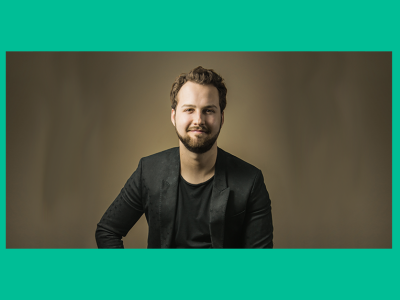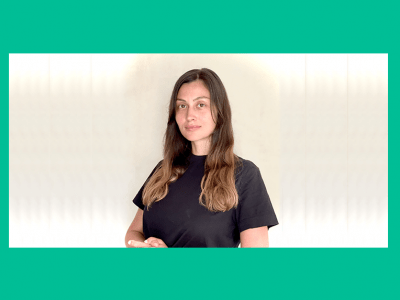EU Alumnus Hidayat Heydarov, Data Scientist and Product Owner at Mercedes-Benz.io
EU alumnus Hidayat Heydarov works at Mercedes-Benz.io as a data scientist and product owner. Hidayat graduated with a BA in International Business from EU Business School’s Munich campus in 2015. He then pursued a master’s in economics and politics from the University of Freiburg. Originally from Azerbaijan, Hidayat now lives and works in Berlin, Germany. He speaks Azerbaijani, English, German, Russian and Turkish. During his very-limited free time he likes to play music and write.
Hidayat spoke to us about his career and working with data at Daimler and then Mercedes-Benz.io.
What path did you take to reach your current role?
My time at EU was focused on international business. I then did the dual program with the University of Derby, focusing on international business management. I was part of the first generation in the program which was pretty cool. After graduation, I thought I would go straight to work but didn’t really find anything that matched what I wanted. I decided to pursue a master’s degree and stay in Germany. I studied at the University of Freiburg where I also taught economics and politics to bachelor’s and master’s students as a graduate teaching assistant. During my last semester I wasn’t convinced by the path I was on, so I took some courses at the University of Basel on machine learning in economics and finance. I decided I wanted to work in this new field with data, so I joined Daimler Financial Services doing a project in risk management, using machine learning to try to predict economic risk based on the global news. That was my first real-world project without having a pre-prepared data set like you do as a student, so it was a “hit the ground running” sort of learning experience. From Daimler, I moved to Mercedes-Benz.io and became a data scientist for a few months before also becoming a product owner.
What exactly is a product owner and what does your current job consist of?
Within the agile structure a product owner, together with a product team, moves all the UX and UI professionals as well as data scientists and engineers to deliver a solution. We work in enablement teams without a manager. There’s always a supervisor but it’s not like the top-down approach where people tell you directly what to do. A product owner does not come up with a product, technical framework or an aesthetic. A product owner makes sure the work being done by the team is, and remains, aligned with the result the team needs to deliver.
What aptitudes are needed to work as a product owner?
Once you’ve grasped the structures, which is a steep learning curve, you are continually exploring new worlds, so being open is really important.

As a product owner, I’m not really “Master Yoda” in every field I’m working in – like data science, data engineering, UX development or front and back end development. Within the team there are people who specifically work on those things. As product owner I need to be open to what they’re saying, because I don’t know everything in detail. I try not to put people under pressure to do specific tasks, they’re always free to decide what they do, with the supervision of Scrum Masters. Because of that, a vital component of the agile system is a communication feedback loop. If there is a properly defined feedback loop within your product development, then everything will work well.
For example, let’s say my team develops a feature and a stakeholder looks at it and gives us feedback. Based on that feedback we will develop the feature further or replace it if it is not what the client wants. So as a product owner you need to be really flexible, make sure that your team is motivated and that they don’t deviate from the final goal. That’s key, because there will be a lot of new things that evolve throughout the process and occasionally even stakeholders who want to deviate from the original goal.
What is a data scientist? How do you work with analytics and process data?
What I’m currently doing as a product owner is to migrate our analytics tech stack to the cloud. As a data scientist, you need to be familiar with all the tools that are available to you. As an analyst, you want to scale up productivity and deliver better things. The cloud is one solution and I would say it’s the only solution that enables you to scale up or handle a lot of information without incurring notable extra cost.
For example, we anonymously track user interaction within Mercedes-Benz websites, which produces a lot of data. This is important for several functions such as descriptive analysis – things like the numbers of unique visitors, unique visits and new leads on the website. There are also predictive analytics where we would, for example, predict a user’s next action. You can see it a lot already on Amazon or Netflix in their recommendation systems. We’re trying to bring that to Mercedes Benz as well. All of this is done with vast quantities of data, which we can’t do on a local system. In order to be able to access large amounts of data, scrub it, organize it and then scale up our work, we are migrating everything to the cloud. It’s a big chunk of my job.
Do you think people are relying more on data and less on gut feeling? What are the pros and cons of that?
People are definitely using more data now which is fortunate because our gut feelings are wrong most of the time – humans are much more biased than data is. However, we still need human judgment to interpret data because most machine learning tools find patterns and correlations, but they don’t look for causation.
For example, we had a case a year ago where management wanted to know the reasons U.K. automotive sales were going down. One of our data science teams concluded that it was due to the impact of coffee prices. Obviously, something about that conclusion doesn’t seem right. Logically, coffee prices won’t directly affect automotive industry sales. But there might be a third variable that impacts both coffee and car sales and you have to look for that. We still need human beings to perform these kinds of interpretations which computers cannot yet do. The optimal order is to gather the data first before interpreting what it signifies.
Start your career with EU Business School
Whether you have a particular role or industry in mind, or like Hidayat are interested in exploring different topics to find out what interests and motivates you the most, EU Business School can help you kickstart your career.
We offer dynamic English-taught programs from bachelor’s to MBA level across our five campuses in Barcelona, Geneva, Montreux, Munich and online. Our pragmatic approach to education gives students first-hand business experience through access to guest speaker sessions, visits to top multinational companies, a diverse international peer group and a faculty of entrepreneurs, consultants and business leaders who draw on their own careers to teach the next generation of innovators and global CEOs.










